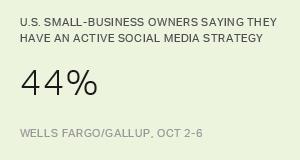PRINCETON, NJ -- More than half of U.S. small-business owners say healthcare costs (54%) and taxes on small businesses (53%) are hurting their operating environment "a lot," making these the top two concerns among eight issues tested in a January Wells Fargo/Gallup Small Business survey. They are followed by the price of energy, government regulations, and the federal debt ceiling.
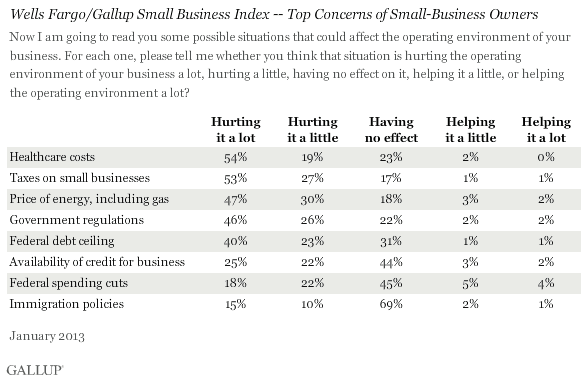
At the bottom of the list of owner concerns are the availability of credit for business, federal spending cuts, and immigration policies. These results are from the quarterly Wells Fargo/Gallup Small Business survey, conducted Jan. 7-11, 2013, with a random sample of 601 small-business owners. Gallup asked a sample of national adults a comparable set of questions, and made a comparative analysis of the responses of the two groups.
In a separate question, owners who say they are not hiring were asked to rate eight reasons why they are not doing so. Sixty-one percent of these owners point to worries about the potential cost of healthcare as the reason they are not hiring, making it fourth on the list. The top three reasons they gave are that they do not need additional help (81%); they are worried about revenues and sales (74%); and they are worried about the overall U.S. economy (66%).
Small-Business-Owner Optimism Increased in January
Overall, U.S. small-business owners are optimistic about the small business operating environment in January, with the Wells Fargo/Gallup Small Business Index increasing to +9 after plunging to -11 in November, after the election. Despite this improvement in sentiment, owner optimism remains below the recent high of +23 in April 2012. It is also lower than the +15 in January of last year.
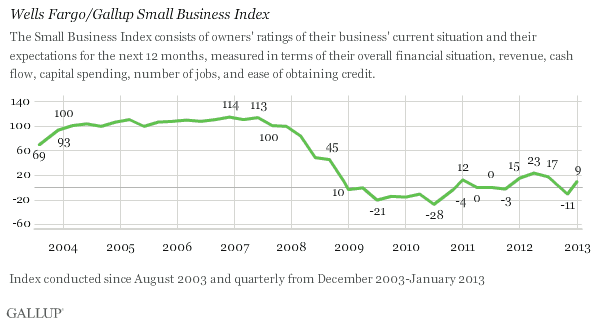
Prior to the recession, index scores were generally at or above 100. The Wells Fargo/Gallup Small Business Index was initiated in August 2003.
Owners' Evaluations of Present and Future Situation Improve
The increase in the overall index is due to small-business owners' becoming more positive about their present situation and their future expectations.
The Present Situation dimension of the index increased to -2 in January from -10 in November. Small-business owners as a group have returned to being essentially neutral about their current operating environment from being more pessimistic last November.
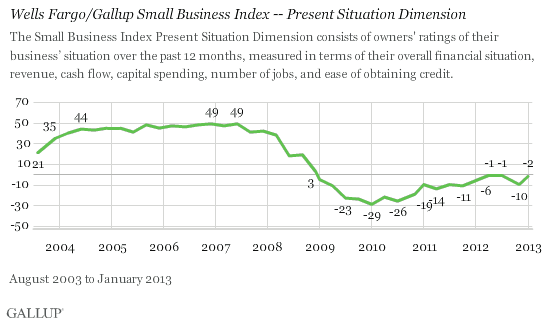
Improvement in the Present Situation dimension was driven by an increase in business owners' assessments of their revenues and capital spending, as well as an improvement in their outlook on the jobs situation over the past 12 months.
The Future Expectations dimension of the index, which consists of owners' ratings of their expectations for their businesses over the next 12 months, increased to +11 in January from -1 in November. This reflects a return to the optimism among small-business owners seen during most of 2012.
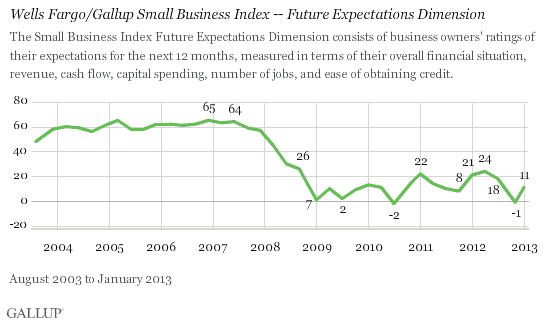
The increase in small-business owners' future expectations was driven by their increased optimism about their future financial situation and their improved expectations for revenues and jobs.
Implications
U.S. small-business owners are clearly concerned about how healthcare costs are affecting their companies. These worries are likely tied -- at least in part -- to the implementation of the Affordable Care Act and its potential impact. Small-business owners are trying to keep their workforces under 50 employees so they are exempted from key parts of the act and in this regard are reducing employee hours so they are not counted as full time.
More generally, it appears small-business owners' optimism has recovered somewhat since turning negative after last year's presidential election. This may be due to the partial resolution of the issues surrounding the fiscal cliff and, perhaps, to the increase in consumer confidence in mid-January. This improvement in the Small Business Index suggests that although the nation's small businesses remain fragile, owners are ready to move their companies forward and the economy ahead if they see significant positive signs in their operating environment in the months to come.
About the Wells-Fargo Small Business Index
Since August 2003, the Wells Fargo/Gallup Small Business Index has surveyed small-business owners on current and future perceptions of their business financial situations.
Survey Methods
Results for the total dataset are based on telephone interviews with 601 small-business owners, conducted Jan. 7-11, 2013. For results based on the total sample of small-business owners, one can say with 95% confidence that the maximum margin of sampling error is ±4 percentage points.
Sampling is done on a random-digit-dial basis using Dun & Bradstreet sampling of small businesses having $20 million or less of sales or revenues. The data are weighted to be representative of U.S. small businesses within this size range nationwide.
In addition to sampling error, question wording and practical difficulties in conducting surveys can introduce error or bias into the findings of public opinion polls.
For more details on Gallup's polling methodology, visit www.gallup.com.
